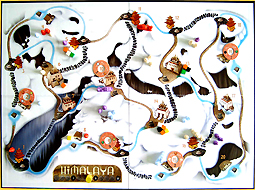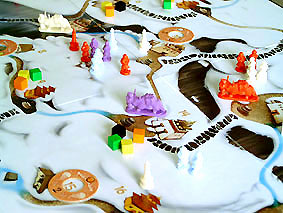Himalaya
page 2
| x |
|
|
|
|
|
|
|
|
|
|
|
|
|
|
|
|
|
|
|
|
|
|
|
|
|
|
 |
|
When completing an order, all the goods depicted on the order-ring have to be delivered at once. This order is then completed and as a reward the player can choose two out of three possible actions:
1. Increase livestock, the player receives a number of yacks equal to the number shown on the order-ring
2. offering, the player places a stupa (resting place for monks) of its color in the village
3. sending delegations, the player sends out a number of delegations to the regions adjacent to the village where the order was fulfilled. If this was a level 1-village, he sends out one delegation, for a level 2-village he sends two delegations, and for a level 3-village three delegations.
|
| x |
|
|
|
|
|
|
|
|
|
|
|
|
|
|
|
|
|
|
|
|
|
|
|
|
|
|
| When all players have performed their six actions, the round is over. Goods and orders are refilled so that there are five villages with goods and five with an order. In rounds 4, 8 and 12 an extra inventory phase takes place: the players display the goods that they have collected behind their screens. The player with the most salt gets three yacks to add to his livestock; the same is done for all the other goods. So in total five times three yacks can be earned in this phase for the five different goods. |
|
  |
| x |
|
|
|
|
|
|
|
|
|
|
|
|
|
|
|
|
|
|
|
|
|
|
|
|
|
|
 |
|
The game ends after round 12. First, points are awarded for the stupas: a stupa in a level 1-village is worth one point, in a level 2-village two points, and in a level 3-village three points. The player with the lowest score for the stupas is immediately eliminated from the game! This player removes all his stupas and delegations from the board. Then, the political influence is evaluated. In each of the eight regions on the board, the player with the majority of delegations scores one point. Again, the player with the lowest political influence is eliminated. The final winner is determined after evaluation of the economical influence of the remaining two players: the player with the largest livestock wins the game! |
| x |
|
|
|
|
|
|
|
|
|
|
|
|
|
|
|
|
|
|
|
|
|
|
|
|
|
|
 |
|
|
|
|
|
|
|
|
|
|
|
|
|
|
|
|
|
|
|
|
|
|
| A fun game! It’s a nice element that the actions and the order in which they have to take place are determined in secret. To be able to make the right decisions, it is very important to anticipate on the actions your opponents are likely to choose: when there are only two goods left in a village, you don’t want to be the third player that arrives there to collect goods! It is also frustrating to arrive in a village with the intention to complete an order, with all the requested goods in your saddlebags, just after another player has fulfilled that very same order and collected the reward… On the other hand it is nice when your opponents have already removed the less valuable salt by the time you arrive to collect goods, so that you can walk away with precious jade instead! |
|


 |
| x |
|
|
|
|
|
|
|
|
|
|
|
|
|
|
|
|
|
|
|
| x |
|
|
|
|
|
|
|
|
|
|
|
|
|
|
|
|
|
|
|
 |
|
|
|
|
|
|
|
|
|
|
|
|
|
|
|
 |
|
|
|
|
|
|
|
|
|
|
|
|
|
|
|
 |
|
|
|
|
|
|
|
|
|
|
|
|
|
|
|
 |
|
|
|
|
|
|
|
|
|
|
|
|
|
|
|
| x |
|
|
|
|
|
|
|
|
|
|
|
|
|
|
|
|
|
|
|
 |
|
|
|
|
|
|
|
|
|
 |
|
|
|
|
|
|
|
|
|
|
|